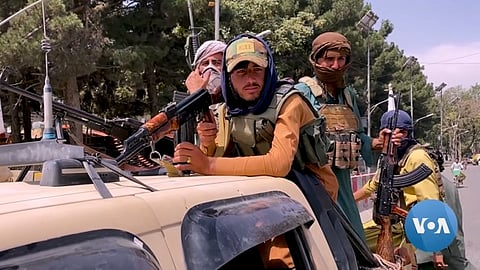
- Home
- न्यूजग्राम
- NewsGram USA
- India
- World
- Politics
- Entertainment
- Culture
- Lifestyle
- Economy
- Sports
- Sp. Coverage
- Misc.
- NewsGram Exclusive
- Jobs / Internships

Taliban authorities in Afghanistan enforced a nationwide ban on beauty parlors Tuesday after the expiration of a one-month deadline for owners to close the businesses, leaving tens of thousands of women without work in a country grappling with poverty.
Since returning to power nearly two years ago, the hardline Taliban have placed sweeping restrictions on the rights of women, barring them from education, public spaces and most forms of employment.
Beauty parlors were one of the few remaining employment opportunities for Afghan women, and a rare public place for them to socialize. Many of their workers were said to be the sole source of income for their households.
The ban puts out of business roughly 12,000 female-run salons, including 3,000 in the capital of Kabul, employing an estimated 60,000 women, according to an Afghan association of the owners.
The Taliban Ministry for the Prevention of Vice and Propagation of Virtue had given beauty salons one month to close, saying they were offering services forbidden by Islam.
A ministry spokesman in a subsequent statement explained that parlors caused economic hardship for grooms' families when brides are taken to these facilities during wedding ceremonies. He asserted that too much make-up would also prevent women from proper ablutions for prayer, while implanting hair and plucking eyebrows are against Sharia, or Islamic law.
The edict outraged owners and beauticians, leading to a couple of rare protest rallies, urging authorities not to deprive them of their only source of earning. Last week, Taliban security forces fired shots into the air and used fire hoses in Kabul to forcefully disperse dozens of women protesting the ban.
The United Nations and human rights groups have opposed the restriction on Afghan beauty parlors. The U.N. Assistance Mission in Afghanistan in a recent statement called on the Taliban to reverse the edict, warning it would adversely affect the national economy and undermine support for women's entrepreneurship.
"The Taliban ban on beauty parlors removes another vital space for women's work at a time when they're struggling to feed their families, eliminates one of the few refuges for women outside the home & further transforms the country into a cruel & extreme outlier in the world," Rina Amiri, the U.S. special envoy for Afghan women, girls and rights, said on Twitter after the Taliban announced they would ban beauty salons.
The restrictions on Afghan women's rights to public life have drawn strong international criticism, with the U.N. denouncing the Taliban administration as "gender-apartheid regime."
No country has recognized the Taliban government, citing their treatment of women.
The fundamentalist de facto leaders justify their policies, saying they are aligned with Afghan culture and Sharia, claims scholars in the rest of Islamic countries dispute and reject.
(VOA/SR)
